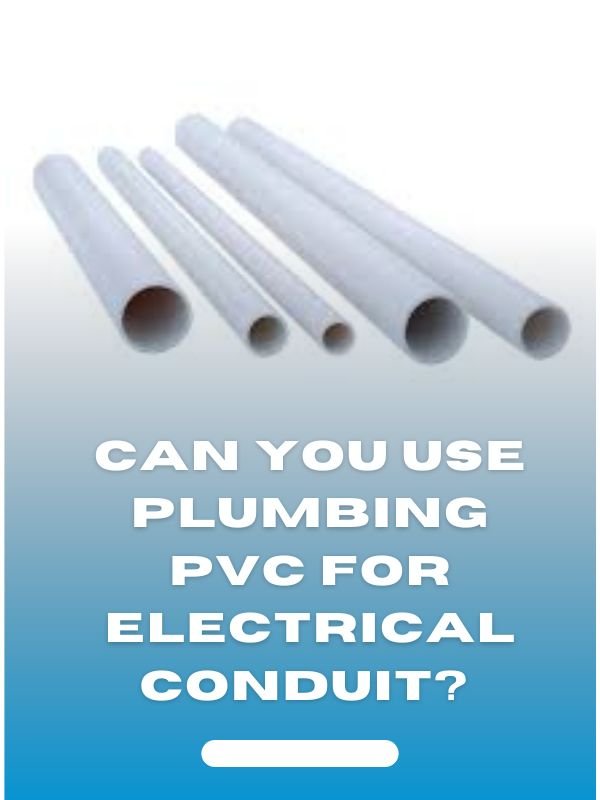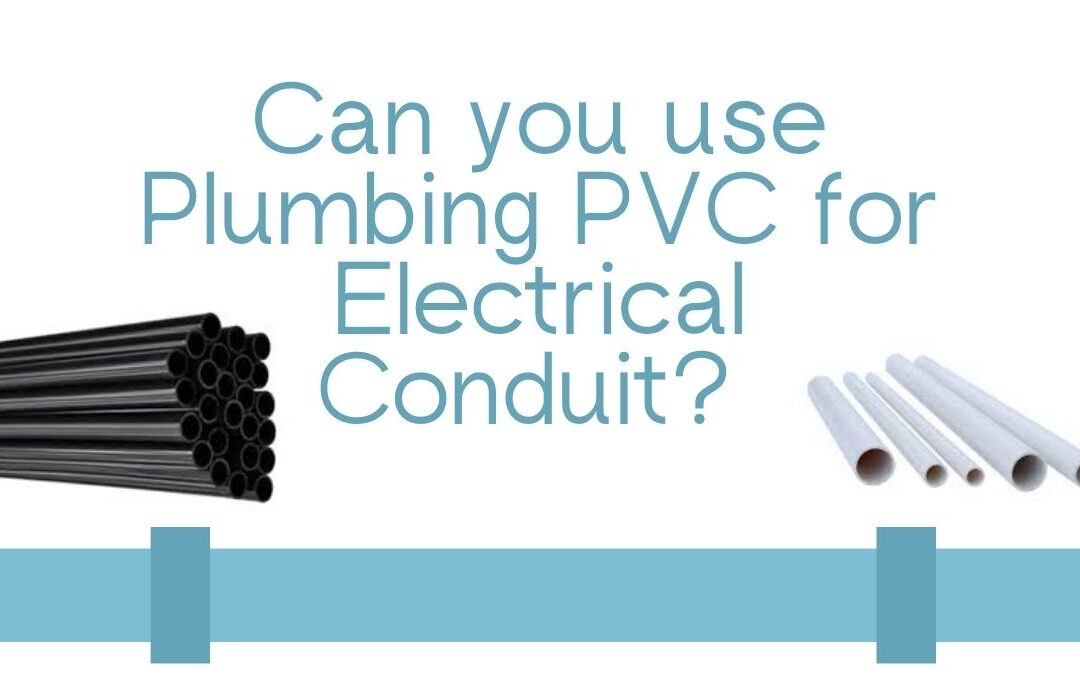When it comes to electrical installations, choosing the right materials for conduit systems is essential. Many DIY enthusiasts and professionals alike often wonder if plumbing PVC can be used as a viable alternative for electrical conduit. In this blog, we will delve into the question, “Can you use Plumbing PVC for Electrical Conduit?” to provide you with valuable insights and guidance. We will explore the compatibility, advantages, limitations, and safety considerations associated with using plumbing PVC in electrical applications. By understanding the key factors at play, you will be better equipped to make informed decisions and ensure the integrity and safety of your electrical installations. Join us as we dive into this intriguing topic and shed light on the possibilities and considerations surrounding the use of plumbing PVC for electrical conduit.
Understanding Plumbing PVC and Electrical Conduit
Can you run Romex in PVC Conduit? This question often arises when considering the use of plumbing PVC for electrical applications. While both materials share similarities in their PVC composition, it is essential to understand the specific requirements and regulations when it comes to running electrical wiring through conduit.
Plumbing PVC, with its excellent durability and affordability, may seem like a tempting option for electrical conduit. However, it is crucial to note that plumbing PVC is not designed or approved for electrical installations. Electrical conduit, on the other hand, is specifically engineered to meet the safety standards and requirements of electrical wiring.
Running Romex, a common type of non-metallic sheathed cable used for residential electrical installations, through PVC conduit raises several concerns. Firstly, Romex cables are typically larger in diameter compared to the conduits designed for electrical applications, making it challenging to fit them properly. Additionally, plumbing PVC may not provide the necessary insulation and protection required for electrical wiring, posing potential risks such as overheating, electrical faults, and compromised safety.
Electrical codes and regulations dictate the materials and methods approved for electrical installations to ensure the protection of wiring and prevent hazards. It is essential to consult local building codes and adhere to the recommended practices when choosing conduit materials for electrical applications. Opting for approved electrical conduit, such as rigid metal conduit (RMC) or electrical-grade PVC conduit, ensures compliance and provides the necessary safety measures for electrical wiring.
Comparing Plumbing PVC and Electrical Conduit
Can you use Plumbing PVC for Electrical Conduit? This question arises when considering the similarities and differences between plumbing PVC and electrical conduit. While both materials are made of PVC, their intended purposes, properties, and code requirements vary significantly.
Plumbing PVC is primarily used for plumbing applications, such as water supply lines and drain pipes. It is known for its durability, chemical resistance, and affordability. Plumbing PVC pipes are available in various sizes and thicknesses to accommodate different plumbing needs. However, it is important to note that plumbing PVC is not designed or approved for electrical installations.
Electrical conduit, on the other hand, is specifically engineered to provide a protective pathway for electrical wiring. It comes in different types, such as rigid metal conduit (RMC), intermediate metal conduit (IMC), and electrical-grade PVC conduit. Electrical conduit is designed to meet the safety requirements and code regulations for electrical installations. It provides insulation, mechanical protection, and grounding capabilities for the electrical wiring within.
When comparing plumbing PVC and electrical conduit, several key differences emerge. Firstly, electrical conduit is manufactured to specific standards and undergoes rigorous testing to ensure its suitability for electrical applications. It is engineered to withstand the demands of electrical systems, including temperature fluctuations, mechanical stress, and environmental conditions.
Additionally, electrical conduit is designed with features that facilitate the installation and maintenance of electrical wiring. It includes fittings, connectors, and accessories specifically designed for electrical conduit systems. Plumbing PVC, on the other hand, lacks these specialised components and may not provide the necessary protection and ease of installation for electrical wiring.
Furthermore, using plumbing PVC for electrical conduit is not compliant with electrical codes and regulations. It can lead to safety hazards, compromised insulation, and increased risks of electrical faults. It is essential to follow the recommended practices and use approved electrical conduit materials for electrical installations.
Code Requirements and Safety Considerations
Can you use Plumbing PVC for Electrical Conduit? When it comes to electrical installations, code requirements and safety considerations play a crucial role in determining the suitability of materials. In the case of plumbing PVC and electrical conduit, there are significant differences in code regulations and safety standards that must be understood and followed.
Electrical installations are governed by specific codes and standards to ensure the safety of the occupants and the proper functioning of the electrical system. These codes outline the approved materials, installation methods, and requirements for electrical conduits. One of the fundamental principles is to use materials that are designed and approved for electrical applications.
Using plumbing PVC for electrical conduit is generally not permitted by electrical codes. Electrical conduit materials, such as electrical-grade PVC, are specifically manufactured to meet the requirements of electrical installations. They undergo testing and certification processes to ensure their safety, durability, and performance in electrical systems. These materials are designed to protect electrical wiring from mechanical damage, provide insulation, and facilitate proper grounding.
On the other hand, plumbing PVC does not meet the necessary electrical code requirements. It lacks the necessary properties and features required for electrical installations, such as proper insulation, fire resistance, and protection against electrical hazards. Using plumbing PVC for electrical conduit can compromise the safety of the electrical system and increase the risk of electrical faults, overheating, and electrical fires.
Furthermore, electrical codes also specify installation methods, such as proper spacing, supports, and securing of the electrical conduit. These guidelines ensure the stability and integrity of the electrical system. Plumbing PVC may not have the necessary components and fittings designed for electrical conduit installations, making it difficult to meet these installation requirements.
To ensure compliance with electrical codes and maintain a safe electrical installation, it is important to use approved electrical conduit materials that meet the specific code requirements. Properly installed electrical conduit provides protection for the wiring, prevents accidental contact, and allows for easy maintenance and future modifications.

Advantages and Limitations of Plumbing PVC for Electrical Conduit
Can you use Plumbing PVC for Electrical Conduit? While it is generally not recommended or allowed by electrical codes, some individuals may still consider using plumbing PVC for electrical conduit due to its availability and cost-effectiveness. However, it is important to understand the advantages and limitations of using plumbing PVC for electrical conduit before making a decision.
Advantages:
- Cost-effective: Plumbing PVC is often more affordable than electrical conduit materials. This can be advantageous for those on a tight budget or working on small-scale electrical projects.
- Easy availability: Plumbing PVC is readily available in many hardware stores and home improvement centers. Its widespread availability makes it convenient for those who need a quick solution for their electrical installation.
- Durability: Plumbing PVC is known for its durability and resistance to corrosion, making it suitable for various applications. While it may not have the same level of strength as electrical-grade PVC, it can still provide adequate protection for electrical wiring in certain situations.
Limitations:
- Safety concerns: One of the major limitations of using plumbing PVC for electrical conduit is the lack of safety features and certifications. Electrical-grade PVC is specifically designed to meet safety standards, including insulation properties, fire resistance, and protection against electrical hazards. Plumbing PVC may not provide the same level of protection and could pose a risk to the electrical system and its users.
- Code compliance: Electrical codes mandate the use of approved electrical conduit materials for electrical installations. Using plumbing PVC for electrical conduit may not meet the code requirements, which could result in failed inspections and legal issues. It is crucial to adhere to the specific materials and installation methods outlined in the electrical codes to ensure compliance and safety.
- Limited functionality: Plumbing PVC may not have the necessary components, fittings, and features designed for electrical conduit installations. It may lack the proper spacing, supports, and grounding provisions required for electrical systems. This can lead to difficulties in installation and maintenance, as well as potential issues with the performance and longevity of the electrical system.
Best Practices and Recommendations
Can you use Plumbing PVC for Electrical Conduit? While it is generally not recommended or allowed by electrical codes, it is crucial to follow best practices and recommendations to ensure the safety and effectiveness of your electrical installations. Here are some important guidelines to consider:
- Adhere to electrical codes: Electrical codes exist for a reason – to ensure the safety and reliability of electrical systems. It is essential to familiarise yourself with the local electrical codes and strictly follow the guidelines regarding approved conduit materials. Using plumbing PVC for electrical conduit may not comply with these codes, potentially leading to safety hazards and legal consequences.
- Use approved electrical conduit materials: To ensure the integrity of your electrical system, it is advisable to use electrical-grade PVC conduit specifically designed for electrical installations. This type of conduit meets the required safety standards, including insulation properties, fire resistance, and protection against electrical hazards. Approved electrical conduit materials provide peace of mind and ensure the longevity of your electrical system.
- Consult with a licensed electrician: If you have any doubts or questions regarding the use of plumbing PVC for electrical conduit, it is highly recommended to seek advice from a licensed electrician. They have the expertise and knowledge to guide you through the proper materials and installation practices, ensuring compliance with electrical codes and safety regulations.
- Prioritise safety and reliability: The electrical system in your home or building plays a crucial role in maintaining a safe and functional environment. Choosing approved electrical conduit materials and following proper installation practices is vital to ensure the safety of occupants and the reliable performance of the electrical system. Don’t compromise on safety by using materials that are not designed for electrical applications.
Releted Post : Can you run Romex in PVC Conduit? |Can I use White PVC for Electrical Conduit? |Will salt damage PVC pipe? | How to Remove Dried PVC Glue from Pipes?|How to Connect Copper Pipe to PVC?|How to Thread PVC Pipe for Your Projects|How Long Does PVC Pipe Last? | Innovative PVC Pipe Dishwasher Designs for Modern Kitchens
Conclusion
In conclusion, it is important to recognize that plumbing PVC is not suitable for use as electrical conduit. Electrical codes and safety regulations exist for a reason – to protect individuals and property from potential hazards. While the two materials may share some similarities, they have distinct differences in terms of their composition, properties, and intended applications. It is crucial to prioritize safety by using approved electrical conduit materials designed specifically for electrical installations. By adhering to electrical codes and consulting with professionals, you can ensure the reliability and safety of your electrical system. So, the answer to the question, “Can you use Plumbing PVC for Electrical Conduit?” is a resounding no.

